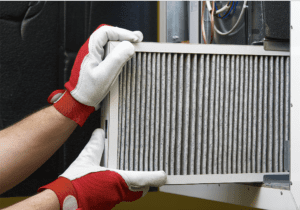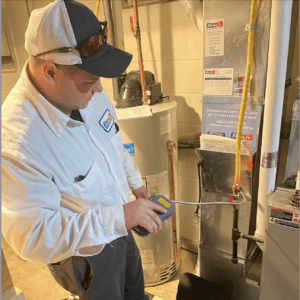Winter is coming: Here’s how to stay warm and save.
Combat inflation and rising natural gas costs as you heat your home this year.
What’s the cheapest way to keep my house warm over the winter? That’s one question we hear often at Bonfe. And it makes sense—after all, Minnesota winters are notoriously long, dark, and cold. With inflation already a concern for many homeowners, it’s unwelcome news that the National Energy Assistance Directors Association (NEADA) is projecting natural gas costs will rise 17 percent this winter. Bonfe is here to help. We’ve compiled a list of simple strategies you can use to help ensure a cozier, warmer winter without breaking the bank.
When fall approaches and winter moves in with lower temperatures, your energy bills start climbing. This year, high energy bills are of even more concern because of across-the-board inflation. And recently, the National Energy Assistance Directors Association (NEADA) released projections of natural gas costs rising as much as 17 percent this winter. If your heating system is inefficient and/or you live in an older home, your home heating bills are probably already on the high side. The last thing you need is for them to get worse. The good news: it can get better. Make this the winter that you stay warm and cozy and save on your energy bills—all while reducing your environmental impact.
Read on for our easy tips to save money and keep your house warm this winter!
Tip #1: Change your furnace filter
Changing your filter is one of the simplest, most cost-effective things you can do right now—with major potential impact. It’s easy to forget about your filter. Out of sight, out of mind, right? But your filter should be checked regularly. How often is “regularly”? Ideally, you’d take a peek at it once a month and should plan on changing your filter every three months. However, if your filter is clogged with dust and debris, it might need changing more often than every 3 months. If you can’t remember the last time you changed your filter, chances are it has been too long. If you have lots of tile/hardwood floors, more than two people in your home, or live with pets or people with sensitivities (e.g., allergies or respiratory/immunocompromising conditions), you may want to change your filter even more often. Why are filters so important? Your furnace has to work hard to move air through the filter. If the filter is clogged, it has to work extra hard—and all that effort is wasted since it can’t efficiently get the warm air where it needs to be. That means you’re paying for all that wasted energy.

Tip #2: Reverse your ceiling fans
This tip always comes as a big surprise to people. Did you know that your ceiling fan likely has a switch on the base that allows the fans to rotate direction? Not all models have this feature, but it’s more common than you’d think In the summer, ceiling fans should run counterclockwise. This pushes air down, which not only keeps cooler air moving around, but also creates the cooling sensation of air pushing past you. In the winter, flip the switch so your fan runs clockwise during the winter months. This direction draws warm air up and pushes it around warm air circulates without creating a cooling downdraft effect.
Tip #3: Go after drafts
Even a tiny draft is enough to make a big impact on your energy bill—and your comfort level. Frost buildup is a sure sign of a leaky window or door. You can check for leaks by putting your hands close to doors and windows. If you feel cold air coming in, or if there is frost buildup, take action. Around the edges of windows, you can use caulk (available at any hardware store) to seal up the leak. Doing this from the outside stops air leaks before they enter your home (and might be a more aesthetically pleasing choice, too). Make sure you’re not caulking your window shut—you’re just sealing up the areas that should have been sealed in the first place. If there’s a draft coming under your door, purchase an inexpensive rubber “door sweep.” If the leak is around the sides, you can use foam tape.
Tip #4: Tune up your furnace
Furnaces and boilers aren’t designed to run indefinitely without upkeep. Investing in a furnace tune-up can easily pay for itself by helping prevent breakdowns and increasing efficiency. Breakdowns never seem to happen at a convenient moment, and if you don’t catch a breakdown promptly, you might risk having frozen pipes that can burst. A trained technician, like our trusted team at Bonfe, can tune up a furnace or boiler with a quick visit. We carry our equipment on our trucks, so we can do an inspection and tune-up or repair all in the same visit. With energy costs rising and temperatures dropping, now is the time to get smart about your plans for this winter. We’re here to help.
Tip #5: Set Back Your Thermostat
A programmable thermostat helps make sure you turn down the heat at night. Setting your thermostat to a cooler temperature at night and throwing an extra blanket on the bed is an easy, cost-effective way to use less energy. If you head out of town for a weekend or extended vacation, you can turn your thermostat down to 60 degrees for the time you’ll be gone. Be sure to leave the bathroom and other doors open so that air can circulate throughout the house.

Are space heaters an energy efficient choice?
Wondering if you can save money by relying on space heaters instead of whole-home heating this winter? Here’s what you need to know. Space heaters aren’t a replacement for whole-home heating. To keep an entire home warm, you’ll likely use up as much—if not significantly more—energy. However, space heaters can be a wonderful supplement to whole-home heating. Space heaters can allow you to reduce the thermostat to a lower level and then use a space heater in the room you’ll be spending time in so you stay comfortable.
Make sure to keep the rest of the home warm enough that pipes won’t freeze and the home itself won’t sustain damage. It’s also important to unplug space heaters when not in use. Combustion heaters in particular are notoriously prone to causing fires. Electric space heaters are the most efficient choice but should still be used with caution to prevent burns and fires.

